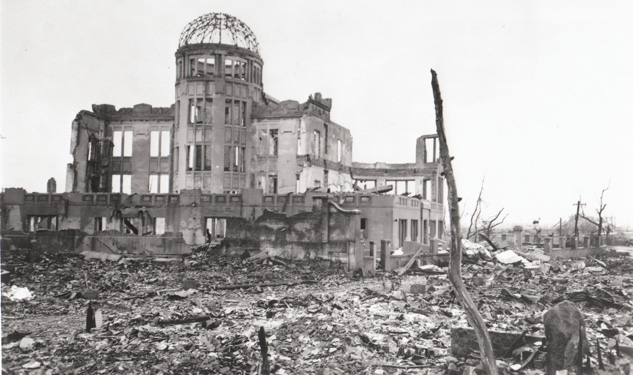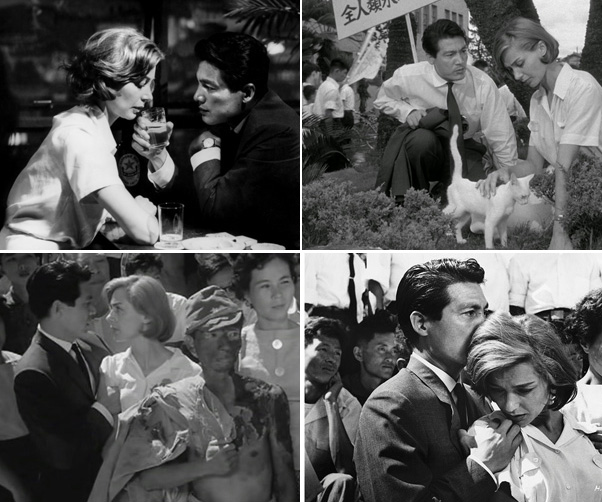
- Hiroshima Day
Memory, Loss and the Atomic Bomb in ‘Hiroshima Mon Amour’
Exactly 70 years after the U.S. nuclear bombings on Hiroshima and Nagasaki, Golden Globes voter H.J. Park parses Alain Resnais’ moody masterpiece Hiroshima Mon Amour, one of the most powerful anti-nuclear and anti-war movies of all time.
There are several movies depicting the destructive power and insanity surrounding nuclear warfare: Black Rain (1989) by Shohei Imamura; Dr. Strangelove Or, How I Learned to Stop Worrying and Love the Bomb (1964) by Stanley Kubrick; and The Day After shown on ABC-TV in 1983.
I believe Hiroshima Mon Amour is superior to all of them. One feels despair and a sense of futility seeing the movie’s depictions of destruction and hate. Personal and collective are delicately intertwined: the lingering image of the shattered landscape, the photographs displayed in the Atom Bomb Museum overlapping the two doomed lovers, their already fading memories of the bomb after a mere 14 years, and the memories of a tortured love affair. Margaret Duras’ sensuous and symbolic dialogue reads like poetry.
The movie begins with the two lovers (Emmanuelle Riva and Eiji Okada) embracing in a room at the Hotel New Hiroshima (the Japanese title of the movie is A 24- Hour Affair). The lovers’ naked bodies, glistening with perspiration, bring to mind two bodies frozen by the ashes of the bomb.
The man, a Japanese architect (the characters have no names) speaks in a monotone, “No, you saw nothing at Hiroshima,” implying that the horror and anguish cannot be seen by naked eyes. The woman, a Parisienne who came to Hiroshima to make a movie about peace, is leaving the next day. She has experienced a sad first love with an occupying German soldier in her hometown, Nevers, and is struggling not to fall in love with another foreigner in another war-ravaged city.
The woman, dressed in white, tells the man, who is dressed in black: “Devour me completely” and “Your body fits me like a glove.” The man begs her to stay for one more week or just another three days. They walk all night on the deserted streets of Hiroshima, lit only by the neon signs of bars. The camera slowly follows their steps. The cinematography in black and white is spare and beautiful.
They stop at a bar, drinking Sapporo beer (Riva downed real beer in this scene and got seriously drunk). She tells him about her love affair with an enemy solder, and the shameful punishment she endured. The scenes are shown in flashbacks. She finally says she would remain, but, she adds, staying will only cheapen their affair, and she should go back to her husband. They are both married to others but Resnais doesn’t judge them. After stopping at another bar, named Casa Blanca, they return to the hotel. The man knocks on her door, demanding to get in, saying, “My name is Hiroshima, and yours is Nevers.” The movie ends with their love unresolved.
Emmanuelle Riva at age 88 was nominated for an Academy Award in 2012 for her role in Amour.
Alain Resnais was a versatile filmmaker, making sci-fi movies, documentaries, comedies, family-friendly movies and musicals during his 70-year career. His movies are not always easy to understand, and never very popular. His main theme seems to be people haunted by memories: besides Hiroshima, Mon Amour, Last Year at Marienbad (1961) also shows past and present stylishly crisscrossing, and it became a cult movie among some intellectuals. Resnais’ short documentary, Night and Fog (1965) was filmed in a Nazi death camp, and is considered as one of the most poetic films about the Holocaust.
Criterion recently released Blue-Ray and DVD Editions of Hiroshima, Mon Amour.
